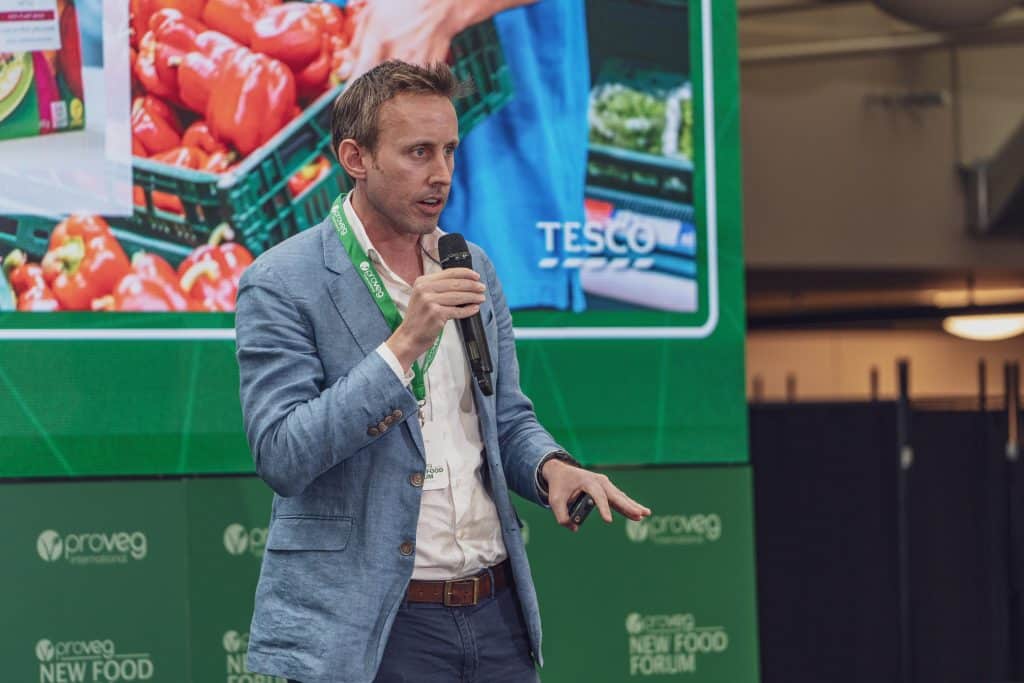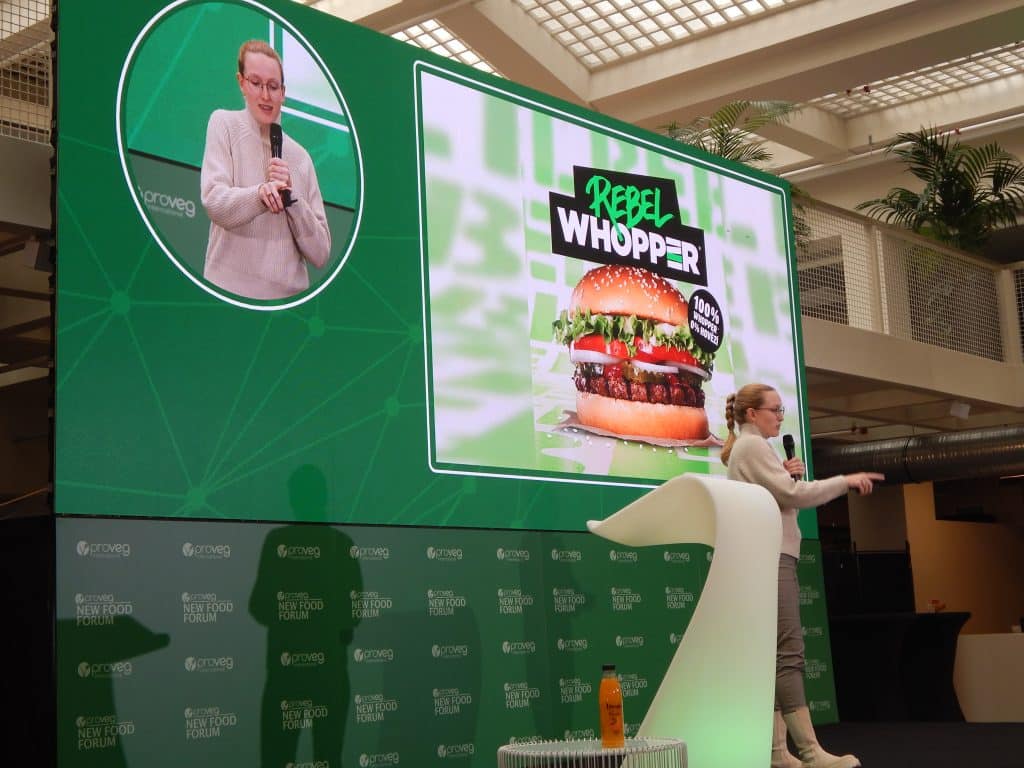New Food Forum is an opportunity to learn, network, and strengthen your alt-protein business
By Gemma Tadman, Content Creator and Writer, ProVeg International
On 26th April, I was lucky enough to attend the New Food Forum 2023 in Prague, Czech Republic, curated by ProVeg Czechia.
Not only was it an excellent opportunity to connect with innovators in the alternative-protein industries, but it enabled me to gather a number of industry insights, direct from those in-the-know.
Read on to discover my top three learnings from New Food Forum (NFF) 2023 to give you an idea of what’s in store for 2024.
Top three learnings from New Food Forum 2023

1. We need to make choosing healthy, sustainable, plant-based foods easy
One of the overarching themes throughout the day’s presentations was the need to make it as easy as possible for consumers to choose healthy and sustainable plant-based foods and beverages.
Today’s average consumers are time-poor and hit by rising living costs; they don’t want to spend hours in shops looking for products that are expensive and bad-tasting.
Therefore, as Tesco’s Product Director, Chris Gee stated in his talk, “We need to make healthy, sustainable choices easy – simple to understand and on the wallets. It can’t cost a lot. So that’s the biggest thing we think about with our Planetary Commitments at Tesco. How do we make it easy?”
Aside from merchandising techniques, consumer purchasing is spurred on by two key aspects – affordability and taste.
In his talk, Gee uncovered Tesco’s Clubcard strategy.
“How did we grow our plant-based products by 300%? One of the ways was through using the ‘power of the Clubcard’ to lower prices and direct customers to certain parts of the shop.”
Price was also a key point in Andreas Schneider’s talk, Head of Retail at Mondarella. Schneider said: “A low price point is very important because you can have good products on the shelf, but if they cost a lot of money, people won’t try it. So, at Mondarella, we take care of this in our pricing strategy, which allows flexitarians to try out our products.”

Taste is also key. Sebastian Tolwinski, Corporate Affairs and Communications Director at Upfield, discussed the taste evolution of plant-based products: “Yes, we [the industry] had a problem with the taste of plant-based products some years ago, but we are improving constantly,” he said, “and I believe taste is almost there. Just try Upfield’s spreads and try to see the difference compared to dairy butter. Before I didn’t like the taste of margarines, but ours are a revolution because of the taste!”
If a new plant-based product is priced low, a consumer is more likely to give it a go – and if a new plant-based product is tasty, a consumer will likely buy it again. Thus, price and taste are closely entwined.
Mondarella has experienced similar taste successes. “We held a blind taste test with almost 80 participants,” said Schneider. “Participants tried our plant-based ‘mozzarella’ compared to conventional mozzarella cheese and other plant-based options. Ours scored much better than the animal-based cheese in blind-tasting and many people didn’t recognise any difference!”
Key takeaways
- Brands/retailers should keep plant-based product pricing low.
- Retailers (and brands) can introduce loyalty cards that lower the prices of plant-based products to make those options more attractive to money-conscious consumers, and even direct consumers towards these products.
- Plant-based products should be tasty – make them the obvious choice for time-poor consumers to grab when they are shopping!
2. Conglomerates see the necessity for a more plant-based food system, as well as the opportunities

In his talk, Gee (Product Director, Tesco) recounted Tesco’s ambitious targets for its plant-based products.
Gee said: “We set ourselves a challenge of growing our plant-based products by 300%, which sounded like a really big number at the time. And actually, we realised that we’re terrible at target setting – we smashed it a few years ago.”
However, Gee explained that “300% wasn’t big enough – we need to go further past that.”
It was encouraging to hear a conglomerate discuss how its big goals for expanding its plant-based range are not even enough, and that more expansion is needed.
Upfield stated even more notable goals: “We believe the future belongs to plant-based,” said Tolwinski. “We will become a 100% plant-based company in three years.”
This suggests that the transition to a more sustainable food system is underway and that multimillion-euro companies are beginning to understand the necessity for the planet, and the opportunities available for business.
Key takeaways:
- Established global corporations have witnessed the necessity for plant-based products as well as the skyrocketing consumer demand, and are now investing in the space.
- The plant-based industry is brimming with opportunities – get involved to make the most of them. Contact ProVeg International for advice on your plant-based product strategy at [email protected].
3. When launching plant-based products, it’s important to tailor your approach to different markets

Kim Hofman, Strategic Planner at Ogilvy, gave an engaging presentation that touched on strategies used by plant-based companies when launching into new markets.
For example, the audience learned that vegetarian brand Quorn has different plant-based communication strategies for different markets. In Sweden, the brand takes an ‘eco’ approach – sustainability is the key tactic used to attract consumers to Quorn’s plant-based range, with consumers encouraged to eat Quorn products to ‘lower their carbon footprint’.
Yet, in the UK, where consumers put taste above environmental motivations, Quorn alters its plant-based approach with taste as the draw in messaging and communications.
Hofman went on to use other examples of brands doing similar things, including Heinz, Burger King, and Oatly, all of whom take time to understand their audiences around the world and tailor their approaches to different markets to maximise sales.
Key takeaways:
- Brands should spend time researching audiences to ensure they fully understand country-specific nuances.
- Brand messaging, communications, and marketing should be tailored to the country/market in which you are launching your plant-based product.
Don’t miss out next time. Get ready for New Food Forum 2024, now!

Attending New Food Forum, you’ll hear first-hand from F&B experts sharing invaluable insights.
You’ll also have plenty of networking opportunities and the chance to join indispensable workshops (plus, the catering provided is amazing!).
NFF welcomes individuals and companies from around the world – if you’re a food producer from abroad who wants to enter the Czech market, NFF is the perfect opportunity to introduce yourself to retailers who are present at the event.
I hope to see you there next year.



